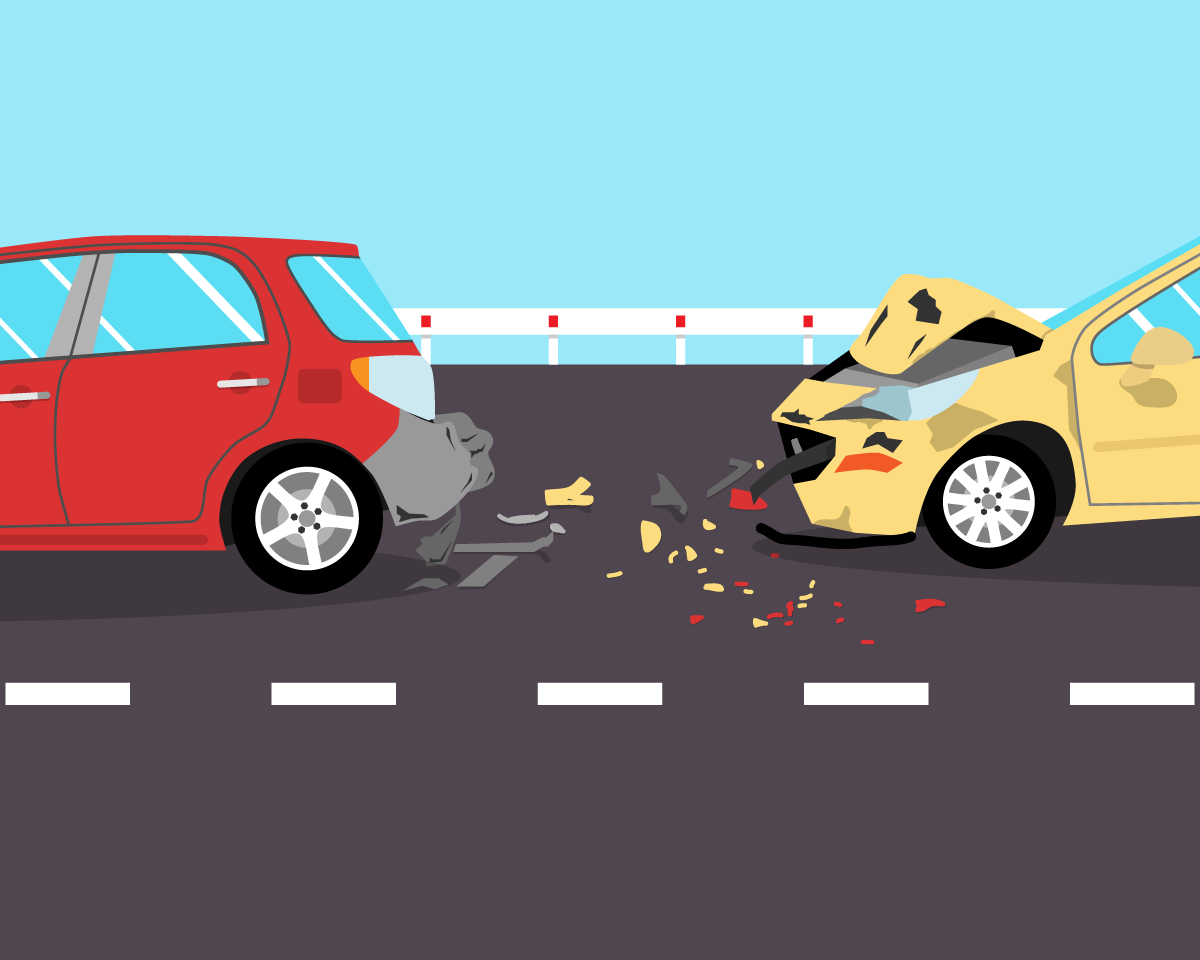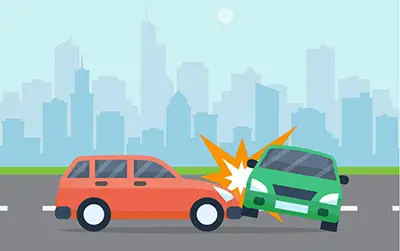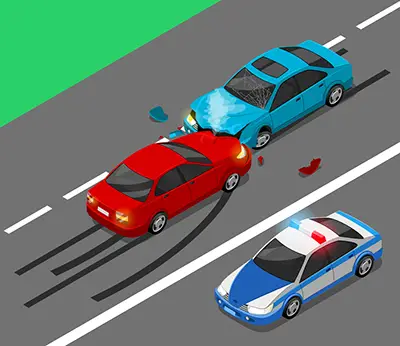How an Accident Can Impact Your Driving Record: What You Need to Know
Understanding how an accident affects your driving record will help you prepare for any potential issues in the future. We’ll discuss what a driving record is, explain how an accident impacts it, provide tips for improving after such an incident, answer common questions about accidents and their effects on records, as well as offer advice for avoiding future mishaps so you can protect your reputation behind the wheel.

What is a Driving Record?
A driving record is a document that outlines your history as a driver. It includes information such as any traffic violations, accidents, or other incidents that have occurred while you were behind the wheel. Your driving record can be used by insurance companies to determine your rates and eligibility for coverage.
There are two types of driving records:
public and private. Public records include all of the information on your license including points, suspensions, revocations, and any convictions or tickets associated with it. Private records may contain additional details about any accidents you’ve been involved in or traffic violations you’ve received but these will not appear on public records unless they result in court action being taken against you.
You can access your own driving record from the Department of Motor Vehicles (DMV) website in most states. You will need to provide personal information such as name, address, date of birth and social security number before being able to view it online or print out a copy for yourself if needed. Depending on where you live there may also be fees associated with obtaining copies of your driving record so make sure to check with the DMV beforehand if this applies to you before requesting one online or in person at their office location(s).
Did you know that any accidents or traffic violations on your driving record can affect your insurance rates? Make sure to check your own driving record from the DMV website for accuracy.
Did You Know
How an Accident Affects Your Driving Record
An accident can have a significant impact on your driving record. Depending on the severity of the incident, it could result in points being added to your license or even a suspension or revocation. It is important to understand how an accident affects your driving record and what you can do to improve it after such an event.
Immediate Impact on Your Driving Record:
When you are involved in an accident, points will be assigned to your driver’s license based on the severity of the incident. Minor accidents may only result in one point being added while more serious ones may add two or three points depending on state laws. If enough points accumulate over time, this could lead to a suspension or revocation of your license.
Long-Term Impact on Your Driving Record:
Even if no points are assigned for minor incidents, they still remain part of your permanent driving record and can be used against you when applying for insurance coverage or other services related to driving privileges. This means that any future traffic violations will likely carry heavier penalties due to prior offenses appearing as part of your history with the DMV (Department Of Motor Vehicles).
Insurance companies often use past records as criteria when determining rates for customers, so having multiple accidents listed within a certain period could cause premiums to increase significantly, even if no actual tickets were issued during those events. In some cases, insurers may even refuse coverage altogether based solely on previous infractions noted within someone’s history with their respective state’s DMV office(s).
Accidents can have a lasting effect on your driving record, including points being assigned to your license and higher insurance premiums. It is important to understand the immediate and long-term impacts of an accident in order to avoid costly consequences.
Key Takeaway
How to Improve Your Driving Record After an Accident
After an accident, your driving record can take a hit. The points assigned to your license and the resulting insurance implications can have long-term effects on your ability to drive legally and safely. Fortunately, there are steps you can take to improve your driving record after an accident.
Take Defensive Driver Courses:
Taking defensive driver courses is one of the best ways to improve your driving record after an accident. These courses teach drivers how to anticipate dangerous situations on the road and react accordingly to avoid accidents or minimize their impact if they do occur. Most states offer these classes online or in person, so it’s easy for anyone with a busy schedule to find time for them. You can also take our free DMV practice test to learn safe driving.
Follow Traffic Laws and Regulations Carefully:
 After an accident, it’s important that you follow all traffic laws and regulations carefully while behind the wheel in order to avoid any further infractions that could negatively affect your driving record even more. This means obeying speed limits, using turn signals when changing lanes or turning corners, coming fully stopped at stop signs instead of rolling through them, etc., as well as avoiding distractions like texting while driving or talking on a cell phone without hands-free technology enabled.
After an accident, it’s important that you follow all traffic laws and regulations carefully while behind the wheel in order to avoid any further infractions that could negatively affect your driving record even more. This means obeying speed limits, using turn signals when changing lanes or turning corners, coming fully stopped at stop signs instead of rolling through them, etc., as well as avoiding distractions like texting while driving or talking on a cell phone without hands-free technology enabled.
Take defensive driver courses to improve your driving record after an accident. - Follow traffic laws and regulations carefully to avoid any further infractions. - Avoid distractions like texting while driving or talking on a cell phone without hands-free technology enabled.
Key Takeaway
Common Questions About Accidents and Their Effect on Your Driving Record
Accidents can have a significant impact on your driving record, and it’s important to understand how they may affect you. Does a minor accident affect your driving record? Generally speaking, any accident that is reported to the DMV will appear on your driving record. This includes both major and minor accidents. However, some states may not report minor incidents if there was no damage or injury involved.
Can I appeal points assigned to my license after an accident? Depending on the state you live in, you may be able to appeal points assessed against your license due to an accident. In most cases, this requires submitting evidence of mitigating circumstances or proof that the incident was not your fault. If successful, the points will be removed from your driving record and won’t count against you when calculating insurance rates or other penalties associated with having too many points on one’s license.
Will my insurance rates increase after an accident? It depends on several factors such as who was at fault for the incident and whether there were any injuries or property damage sustained during the crash. Generally speaking, yes – if you are found at-fault for an accident then it is likely that your insurance premiums will go up as a result of filing a claim related to said incident. Additionally, even if another driver is found responsible for causing the crash but their insurer does not cover all damages incurred by yourself (or others), then it is possible that additional costs could still be passed onto yourself through higher premiums over time as well.
Accidents can have a major impact on your driving record, including points being assessed against your license. You may be able to appeal these points and insurance rates could also increase as a result of the accident. Key takeaways: • Accidents reported to DMV will appear on driving record • Appeal process available in some states • Insurance premiums likely to go up after filing claim
Key Takeaway
Tips for Avoiding Future Accidents and Protecting Your Driving Record
 Practicing safe and responsible driving habits is the best way to avoid future accidents and protect your driving record. Always obey traffic laws, pay attention to road signs, use turn signals when necessary, and maintain a safe speed limit. Additionally, make sure you are always aware of your surroundings while on the road; be mindful of other drivers’ actions as well as any potential hazards such as potholes or debris in the roadway.
Practicing safe and responsible driving habits is the best way to avoid future accidents and protect your driving record. Always obey traffic laws, pay attention to road signs, use turn signals when necessary, and maintain a safe speed limit. Additionally, make sure you are always aware of your surroundings while on the road; be mindful of other drivers’ actions as well as any potential hazards such as potholes or debris in the roadway.
Staying alert and paying attention to the road ahead is also essential for avoiding future accidents. Make sure you have plenty of rest before getting behind the wheel so that you can remain focused on driving safely. Avoid distractions like eating or drinking while driving, using your phone for anything other than navigation purposes, or engaging in conversations with passengers if they take away from your focus on the task at hand: operating a motor vehicle safely.
Stay safe on the road and protect your driving record. Obey traffic laws, pay attention to signs, use turn signals when necessary, and remain aware of your surroundings. Avoid distractions like eating or using your phone while driving.
Stay safe
FAQs in Relation to Accident Affects Driving Record
How long does an accident stay on my driving record?
The length of time an accident stays on your driving record varies by state. Generally, accidents remain on a driver’s record for three to five years, though some states may keep records for longer periods of time. In most cases, minor violations such as speeding tickets will stay on the record for two to three years while more serious offenses like DUI or reckless driving can remain up to 10 years. It is important to check with your local DMV office in order to determine how long an accident remains on your driving record in your particular state.
What happens if I get into an accident while driving with a learner’s permit?
If you get into an accident while driving with a learner’s permit, the consequences will depend on the severity of the incident. If it is minor, such as a fender bender or hitting something stationary like a parked car, then you may only be responsible for any damage caused and may not face further legal repercussions. However, if there are injuries or more serious property damage involved in the accident, then you could potentially face fines and/or criminal charges depending on your state’s laws. In either case, it is important to contact your local DMV office immediately to discuss what steps need to be taken next.
Does a minor fender-bender affect my insurance rates?
Yes, a minor fender-bender can affect your insurance rates. Depending on the severity of the accident and who is at fault, your insurance company may increase your premiums or even cancel your policy. It’s important to contact your insurer as soon as possible after an accident so they can assess the situation and determine if any changes need to be made to your coverage. Additionally, it’s important to always drive safely and follow all traffic laws in order to avoid accidents that could lead to increased insurance costs.
Are there any ways to remove points from my driving record after an accident?
Unfortunately, no. Points remain on your driving record for a certain period of time depending on the state you live in and the severity of the offense. In some states, points can stay on your record for up to three years or more. The only way to remove points from your driving record is by taking an approved defensive driving course or traffic school program which may be offered online or in person. Completing such a course will help reduce any fines associated with an accident as well as potentially reducing insurance premiums.
Can I be charged with reckless driving if I am involved in an accident?
It is possible to be charged with reckless driving if you are involved in an accident. This charge may depend on the circumstances of the incident, such as how fast you were going and whether or not you were following traffic laws. If it is determined that your actions caused harm or risk to other drivers, pedestrians, or property then a reckless driving charge could be applied. It is important to always follow traffic laws and drive responsibly in order to avoid any potential charges related to accidents.
Conclusion
In conclusion, it is important to understand how an accident affects your driving record. An accident can have a negative impact on your record and result in higher insurance premiums or even license suspension. To protect your driving record, you should take steps to avoid future accidents by following the rules of the road and practicing safe driving habits. Additionally, if you are involved in an accident, be sure to contact your insurance company right away so that they can help guide you through the process of filing a claim and repairing any damage done as a result of the accident. By understanding how an accident affects your driving record and taking proactive steps to improve it after an incident occurs, you will be able to keep yourself safe on the roads while also protecting your financial security.
References:
https://www.nerdwallet.com/article/insurance/how-long-accidents-affect-insurance-rates
